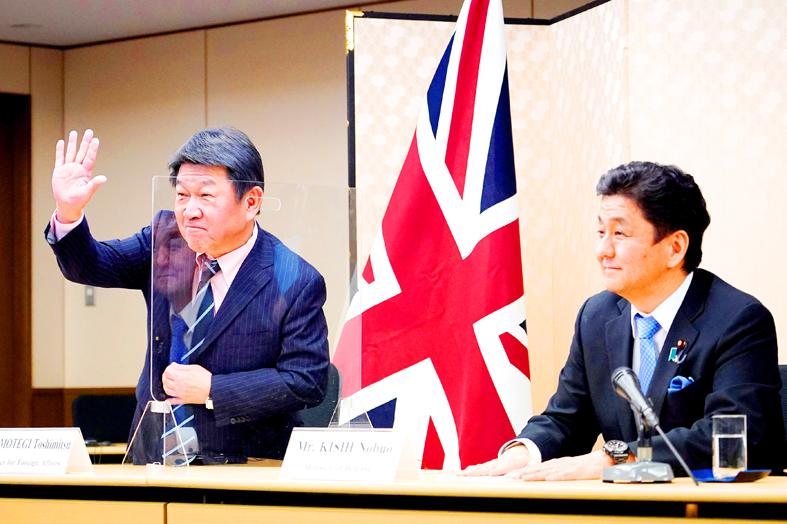US Secretary of State Antony Blinken on Wednesday voiced concern over China’s incursions into Japanese territorial waters, recommitting to the ally’s defense.
In a telephone call, Blinken and Japanese Minister of Foreign Affairs Toshimitsu Motegi “expressed concern over increased Chinese assertiveness around the Senkaku Islands [Diaoyutai Islands, 釣魚台] following China’s enactment of a new coast guard law,” US Department of State spokesman Ned Price said.
“Secretary Blinken reaffirmed that the Senkakus fall within the scope of Article V of the US-Japan Security Treaty,” he said, referring to the section that commits the two nations to defend each other if either is attacked.

Photo: Reuters
Tokyo has voiced alarm over increased Chinese incursions after Beijing enacted legislation allowing its coast guard to use weapons against foreign ships seen as illegally entering its waters.
Japan administers the rocky islets in the East China Sea that are also claimed by Taiwan and China, which calls them the Diaoyu Islands (釣魚島).
Blinken’s call comes as US President Joe Biden promises to maintain the hard line of his predecessor, former US president Donald Trump, on a rising China, while also paying closer attention to allies.
Former US secretary of state Hillary Rodham Clinton first said that the Senkakus fell under Article V, although Trump went a step further by warning against attempts to contest Japan’s control over them.
The State Department said that Blinken and Motegi also discussed last week’s military coup in Myanmar, where Biden is rolling out punishment for the generals if they do not return power to elected leaders.

Tens of thousands of Filipino Catholics yesterday twirled white cloths and chanted “Viva, viva,” as a centuries-old statue of Jesus Christ was paraded through the streets of Manila in the nation’s biggest annual religious event. The day-long procession began before dawn, with barefoot volunteers pulling the heavy carriage through narrow streets where the devout waited in hopes of touching the icon, believed to hold miraculous powers. Thousands of police were deployed to manage crowds that officials believe could number in the millions by the time the statue reaches its home in central Manila’s Quiapo church around midnight. More than 800 people had sought

DENIAL: Pyongyang said a South Korean drone filmed unspecified areas in a North Korean border town, but Seoul said it did not operate drones on the dates it cited North Korea’s military accused South Korea of flying drones across the border between the nations this week, yesterday warning that the South would face consequences for its “unpardonable hysteria.” Seoul quickly denied the accusation, but the development is likely to further dim prospects for its efforts to restore ties with Pyongyang. North Korean forces used special electronic warfare assets on Sunday to bring down a South Korean drone flying over North Korea’s border town. The drone was equipped with two cameras that filmed unspecified areas, the General Staff of the North Korean People’s Army said in a statement. South Korea infiltrated another drone

COMMUNIST ALIGNMENT: To Lam wants to combine party chief and state presidency roles, with the decision resting on the election of 200 new party delegates next week Communist Party of Vietnam General Secretary To Lam is seeking to combine his party role with the state presidency, officials said, in a move that would align Vietnam’s political structure more closely to China’s, where President Xi Jinping (習近平) heads the party and state. Next week about 1,600 delegates are to gather in Hanoi to commence a week-long communist party congress, held every five years to select new leaders and set policy goals for the single-party state. Lam, 68, bade for both top positions at a party meeting last month, seeking initial party approval ahead of the congress, three people briefed by

Cambodia’s government on Wednesday said that it had arrested and extradited to China a tycoon who has been accused of running a huge online scam operation. The Cambodian Ministry of the Interior said that Prince Holding Group chairman Chen Zhi (陳志) and two other Chinese citizens were arrested and extradited on Tuesday at the request of Chinese authorities. Chen formerly had dual nationality, but his Cambodian citizenship was revoked last month, the ministry said. US prosecutors in October last year brought conspiracy charges against Chen, alleging that he had been the mastermind behind a multinational cyberfraud network, used his other businesses to launder